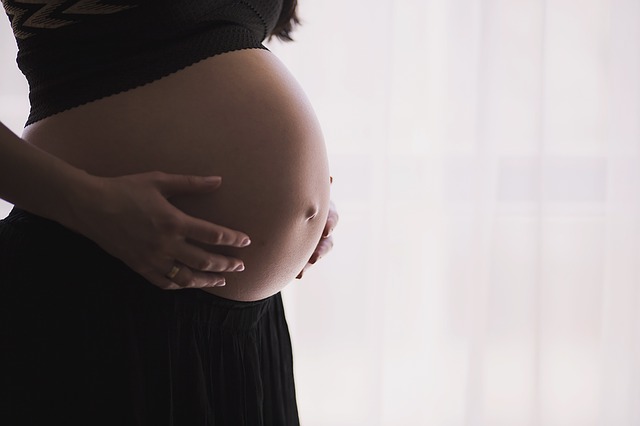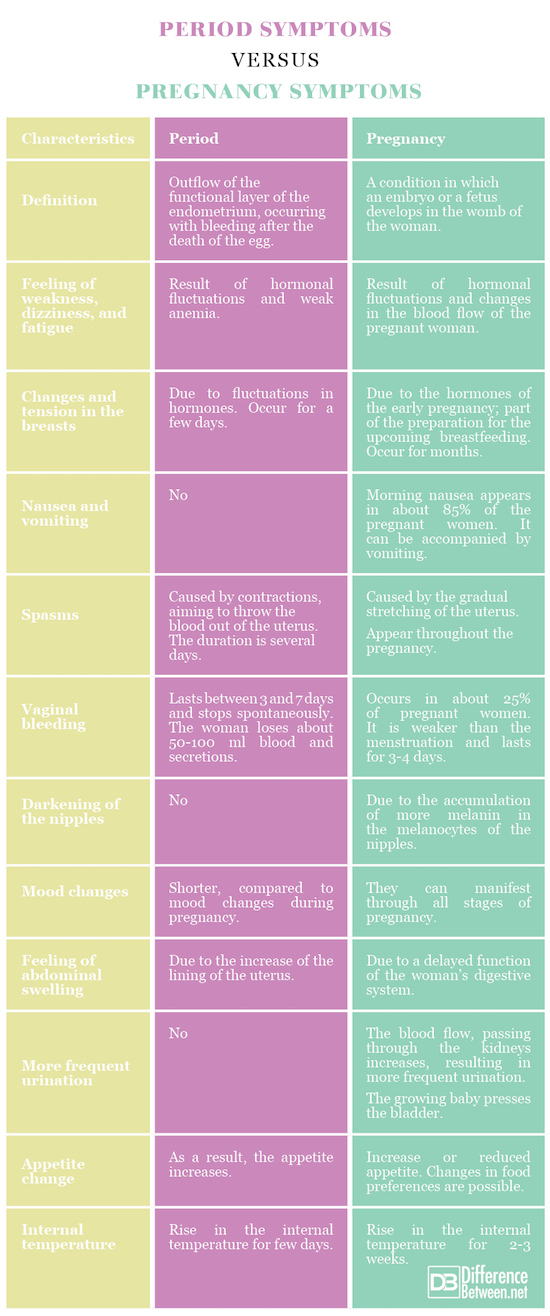Difference Between Period and Pregnancy Symptoms
What is Period Symptoms?
Period (menstruation) is the outflow of the functional layer of the endometrium that occurs with bleeding after the death of the egg. This layer is prepared to shelter the egg, in case it is fertilized. Menstruation is repeated from puberty to menopause periodically, on average 28 days. The shortest normal interval is 21 days and the longest is 35 days. The different length of the menstrual interval in women is explained by hereditary and individual characteristics.
The menstrual cycle is rhythmic (or normal) when menstruations alternate at equal intervals. Changes in rhythm may occur with neurovegetative and neuropsychic irritations or with environmental changes.
In normal menstruation, the woman loses an average of about 50-100 ml blood mixed with secretions from the uterus and vagina. Menstrual blood has a characteristic red-brown color, it is fluid, and it is difficult to clot.
Menstruation is a process that occurs with a number of symptoms. Only about 16-18% of women have no complaints. Some changes, called premenstrual syndrome, precede bleeding. Other symptoms occur during the period. Characteristic symptoms are:
- Feeling of weakness, dizziness, and fatigue;
- Changes and tensions in the breasts;
- Pain in the waist and low in the abdomen, spasms;
- Changes in appetite;
- Headache;
- Mood changes;
- Feeling of abdominal swelling;
- Slightly increased internal temperature;
- Puffiness, etc.
What is Pregnancy Symptoms?
Pregnancy is a condition in which an embryo or a fetus develops in the womb of the woman. The term “embryo” is used to describe the developing organism during the first 8 weeks of gestation and the term “fetus” is used from the 9th week of gestation.
Birth usually occurs about 38 weeks after conception or about 40 weeks after the beginning of the last menstruation.
After the fertilization of the egg, changes occur both in the functioning of the organs and in the emotional state of the pregnant woman. Sometimes the early symptoms of pregnancy resemble the symptoms of premenstrual syndrome.
Not every woman has all the symptoms of an early pregnancy. The symptoms occur with different intensity.
The most common symptoms in early pregnancy are:
- Delay/lack of menstruation;
- Feeling of weakness, dizziness, and fatigue;
- Swelling, increased sensitivity or soreness of the breasts;
- Feeling of abdominal swelling;
- Nausea;
- Spasms;
- Slight vaginal bleeding;
- Darkening of the nipples;
- Mood changes;
- More frequent urination;
- Backache;
- Changes in appetite;
- Headache;
- Constipation;
- Slightly increased internal temperature, etc.
Difference Between Period and Pregnancy Symptoms
Definition
Period: Period (menstruation) is the outflow of the functional layer of the endometrium occurring with bleeding after the death of the egg.
Sprain: Pregnancy is a condition in which an embryo or a fetus develops in the womb of the woman.
Feeling of weakness, dizziness, and fatigue
Period: The feeling of weakness, dizziness, and fatigue is a result of hormonal fluctuations and weak anemia (caused by the significant loss of blood).
Pregnancy: The feeling of weakness, dizziness, and fatigue in pregnancy are due to hormonal fluctuations and changes in the blood flow of the pregnant woman (caused by the uterine growth).
Changes and tensions in the breasts
Period: Sometimes women experience swelling, increased sensitivity or soreness in the breasts before their period. They are due to fluctuations in hormones. The symptoms occur for a few days.
Pregnancy: Breasts become swollen, painful, and more sensitive due to the hormones of the early pregnancy. This is part of the preparation of the body and glands for the upcoming breastfeeding. The symptoms occur for months.
Nausea and vomiting
Period: Usually there are no nausea and vomiting during the period.
Pregnancy: Morning nausea appears as a symptom in about 85% of the pregnant women, four to eight weeks after conception. It can be accompanied by vomiting.
Spasms
Period: During the period, prostaglandins are released in large doses, causing contractions of the uterus. The aim of these contractions is to throw the blood out of the uterus. The duration is several days.
Pregnancy: A feeling of abdominal soreness and spasms is typical for the onset of pregnancy, when the uterus is stretched gradually to make a place for the development of the embryo. The spasms appear throughout the pregnancy.
Vaginal bleeding
Period: Menstrual bleeding (red-brown in color) lasts between 3 and 7 days and stops spontaneously. The woman loses an average of about 50-100 ml blood and secretions.
Pregnancy: Slight vaginal bleeding (pink or brownish) occurs in about 25% of pregnant women at the time of implantation. It is weaker than the menstruation and lasts for 3-4 days.
Darkening of the nipples
Period: No darkening of the nipples occurs during the period.
Pregnancy: Under the influence of the elevated hormone levels during pregnancy, more melanin accumulates in the melanocytes of the nipples. This causes darkening of the nipples.
Mood changes
Period: Mood changes can be observed before and during menstruation. They are shorter compared to mood changes during pregnancy.
Pregnancy: Mood may change in both extremes – from a feeling of happiness to a sudden depression. They can manifest through all stages of pregnancy.
Feeling of abdominal swelling
Period: Under the action of hormones the lining of the uterus increases. This leads to a feeling of abdominal swelling. Before the onset of menstruation, the mucous membrane is thickest and the swelling is most pronounced.
Pregnancy: An increased level of progesterone during pregnancy slows down the function of the woman’s digestive system. This leads to a feeling of abdominal swelling.
More frequent urination
Period: More frequent urination is not a typical symptom of the period.
Pregnancy: During pregnancy, the blood flow, passing through the kidneys increases, resulting in more frequent urination. Frequent urination increases as pregnancy progress due to pressure caused by the growing baby to the bladder.
Appetite change
Period: The body needs more energy, respectively food. As a result, the appetite increases.
Pregnancy: Some pregnant women have an increased appetite, others – reduced one. Changes in food preferences are possible.
Internal temperature
Period: The rise in the internal temperature measured in the morning with half or more degrees is usually characteristic of the ovulation period and decreases with the onset of menstruation.
Pregnancy: During pregnancy, the high internal temperature remains elevated for 2-3 weeks.
Period VS. Pregnancy Symptoms : Comparison Chart
Summary of Period VS. Pregnancy Symptoms
- Period is the outflow of the functional layer of the endometrium, occurring with bleeding after the death of the egg.
- Pregnancy is a condition in which an embryo or a fetus develops in the womb of the woman.
- The feeling of weakness, dizziness, and fatigue during the period is a result of hormonal fluctuations and weak anemia (caused by the significant loss of blood). During pregnancy, these symptoms are due to hormonal fluctuations and changes in the blood flow of the pregnant woman (caused by the uterine growth).
- The swelling and increased sensitivity in the breasts before the period is due to fluctuations in hormones and occur for a few days. In the early pregnancy, these symptoms also occur, but they are part of the preparation of the body for the upcoming breastfeeding and occur for months.
- Usually, there are no nausea and vomiting during the period, while morning nausea appears as a symptom in about 85% of the pregnant women, four to eight weeks after conception.
- Spasms appear throughout the pregnancy and for several days during/prior to the period.
- Menstrual bleeding lasts between 3 and 7 days and stops spontaneously. About 50-100 ml of blood and secretions are released. Slight vaginal bleeding occurs in about 25% of pregnant women. It is weaker than the menstruation and lasts for 3-4 days.
- Under the influence of the elevated hormone levels during pregnancy, more melanin accumulates in the melanocytes of the nipples, causing darkening.
- Mood changes can be observed before and during menstruation, for few days. The mood may change through all stages of pregnancy.
- More frequent urination is a typical symptom of pregnancy, but does not occur during the period.
- During the period the body needs more energy and the appetite increases. Some pregnant women have an increased appetite, others – reduced one.
- The internal temperature rises for few days prior to the period and for 2-3 weeks at the beginning of the pregnancy.
- Difference Between Gallstones and Cholecystitis - September 5, 2021
- Difference Between Constipation and Cramping - August 4, 2021
- Difference Between Whole Genome Sequencing and Microarray - May 6, 2021
Search DifferenceBetween.net :
Leave a Response
References :
[0]Image credit: https://pixabay.com/en/cup-menstrual-menstruation-rule-3137098/
[1]Image credit: https://www.maxpixel.net/Pregnant-Pregnant-Woman-Mother-Body-Pregnancy-1245703
[2]Hoffman, B., J. Schorge, K. Bradshaw, L. Halvorson, J. Schaffer, M. Corton. Williams Gynecology, Third Edition. New York: McGrow-Hill 2016. Print.
[3]Montgomery, W. An Exposition of the Signs and Symptoms of Pregnancy The Period of Human Gestation. Charleston: BiblioLife LLC. 2015. Print.
[4]Pirjova, B., N. Nachev. Physiology. A textbook for students in medicine and dentistry. Sofia: Arso. 2000. Print.



